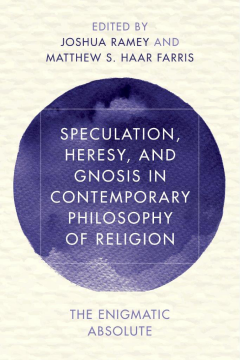
BOOK
Speculation, Heresy, and Gnosis in Contemporary Philosophy of Religion
Joshua Ramey | Matthew S. Haar Farris
(2016)
Additional Information
Book Details
Abstract
Many in continental philosophy of religion aver that we are in a new moment, one where the intellectually marginalized and religiously bastardized traditions of mystical, intuitive, and esoteric apprehensions must be re-articulated and appreciated anew. In an era marked by catastrophic events and atrophied cultural institutions, what seems to be needed is an affirmation of the human potential to truck with non-human or even inhuman forces and intentions, at scales of speed, slowness, or intensity that break with consensual conceptions of human limitations. The essays in this volume outline patterns of mind and mortality, existence and ecstasy, creativity and expression, political possibility and religious matrix from a position that takes quite seriously possible relations with the absolute, however enigmatic, that modernity has denied and postmodernity has obscured in the name of academic skepticism and humanist reservations. Beyond post-modernist pastiche and post-secular nostalgia, these essays explore the potencies of archaic spiritual disciplines as well as the passions driving the mystical, heretical, and Gnostic intimations riddling contemporary relations with the absolute.
Matthew S. Haar Farris is Lecturer in Philosophy at California State University, Fresno.
Joshua Ramey is Assistant Professor of Philosophy at Grinnell College. He is the author of The Hermetic Deleuze (2012), the co-translator of François Laruelle’s Non-Philosophical Mysticism for Today (forthcoming), and the author of Politics of Divination (2016).
Ramey and Harris have expertly orchestrated a colloquy of diversely placed voices in praise of “the enigmatic absolute.” The end result is certainly a “reframing” of continental philosophy of religion and so an offer of a reflective space within that academic niche that is less beholden to an anti-Enlightenment polemic. But even more basically, what readers get from this unusual gathering of avant-garde essayists is remarkably intelligent encouragement to explore neglected forms of reverence that have nevertheless retained their capacity to seed the stony soil of dogmatic skepticism and bear new fruit.
James Wetzel, Professor of Philosophy and Augustinian Endowed Chair, Villanova University
Contemplating enigma and chaos, amidst the nebulous rigours of the indeterminate and the animal, this collection offers the reader a brilliant adventure along the outer edges of thought—where mysticism and philosophy can’t keep their hands off each other.
Catherine Keller, Drew University
Daring, provocative, experimental, and occasionally very strange, these essays gather the efforts of a new generation to think beyond the limits of modern reason. Speculation, heresy, gnosis . . . it can all be found here.
Philip Goodchild, Professor of Religion and Philosophy, University of Nottingham
Thought as theurgy. That is what this book is about: scholarship as collaboration with the Absolute that changes the Absolute. The claim is as outrageous as the possibilities are endless. Here, in these pages, the reader is treated to a broad array of thought experiments on everything from astute reflections on the contemporary doyens of Continental philosophy (Derrida, Deleuze and Guattari, in particular), through acts of intellectual heresy and claims of academic gnosis, to the Salem witch trials, Sexmagic, the philosophy of pessimism and (perhaps my favorite) the mysticism of stupidity. To sum up this book is impossible. That’s the point.
Jeffrey J. Kripal, J. Newton Rayzor Professor of Religion, Rice University, and author of The Serpent’s Gift: Gnostic Reflections on the Study of Religion
Table of Contents
| Section Title | Page | Action | Price |
|---|---|---|---|
| _GoBack | 17 | ||
| _GoBack | 58 | ||
| _GoBack | 91 | ||
| _GoBack | 129 | ||
| Essay | 145 | ||
| _GoBack | 166 | ||
| _GoBack | 167 | ||
| _GoBack | 247 | ||
| _GoBack | 269 | ||
| _GoBack | 281 | ||
| _GoBack | 299 |
